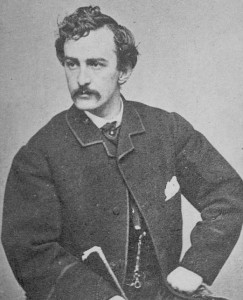Accounts from Gene Smith’s 1992 history, American Gothic, about a pair of times when President Lincoln watched performances by the noted actor and his future assassin, John Wilkes Booth, on stage in Washington D.C. The first “meeting” took place in 1863.
___________________________
John was about to turn twenty-five, and of a theatrical stature to set himself up as a more or less permanent resident star in a leading city. He chose Washington. The wartime capital was bursting with people, and entertainments of any type drew capacity crowds. He opened as Richard III at Grover’s Theatre, on April 11, 1863, billed as “The Pride Of The American People–The Youngest Tragedian In The World–A Star Of The First Magnitude–Son Of The Great Junius Brutus Booth–Brother And Artistic Rival Of Edwin Booth.” President Lincoln attended. The National Republican said he scored a “complete triumph” and “took the hearts of the people by storm.” A day later the paper added that his playing created a sensation. “His youth, originality, and superior genius have not only made him popular but have established him in the hearts of the Washington people as a great favorite.” The National Intelligencer said he owned “that which is the grand constituent of all truly great acting, intensity. We have only to say that this young actor plays not from stage rule, but from his soul, and his soul is inspired with genius. Genius is its own schoolmaster: It can be cultivated but not created.•
___________________________
Accompanying President Lincoln and his wife to the theater one night were the two daughters of Cassius M. Clay, U.S. Minister to Russia. Their mother was an old friend of Mary Todd Lincoln and when they sent in their cards to her she responded with the invitation. As the party drove, a piece of iron suddenly sprung up and pierced the carriage seat between the President and his wife. For a moment an alarmed Mary Lincoln thought it was an attack. Mary Clay asked the President what measures he took to be guarded–no czar of Russian would go through a St. Petersburg street without cavalry escort and with police, detectives, and plainclothesmen along the route, and for good reason–and the President said, “I believe when my time comes there is nothing that can prevent my going.”
The star performer played a villain and twice “in uttering disagreeable threats came very near” and appeared to point to the President. “When he came a third time I was impressed by it, and said, ‘Mr. Lincoln, he looks as if he meant that for you.'”
“‘Well,'” he said of John Booth, “‘he does look pretty sharp at me, doesn’t he?'”•

